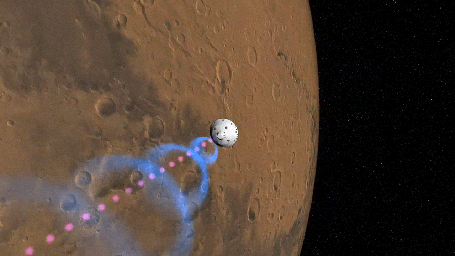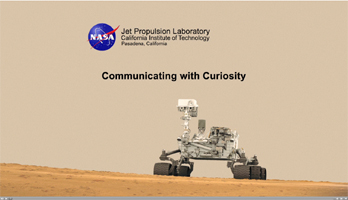
|
Communicating with Curiosity (Artist’s Concept)
- Click the image above for a larger view
 Movie Download Options
Movie Download Options- Full-Res JPEG (1279 x 719) (83.2 kB)
- Full-Res TIFF (1279 x 719) (2.8 MB)
Caption:

Click on the image for the animation
This artist's animation shows how NASA's Curiosity rover will communicate with Earth via two of NASA's Mars orbiters, Mars Reconnaissance Orbiter and Odyssey. As the rover descends to the surface of Mars, it will send out two different types of data: basic radio-frequency tones that go directly to Earth (pink dashes) and more complex UHF radio data (blue circles). Odyssey will pick up the UHF signal and relay it immediately back to Earth (seen as a beam of small blue circles). Meanwhile, Mars Reconnaissance Orbiter will record the UHF data and play it back to Earth at a later time.
Back on Earth, the rover's signals are picked up by large antenna dishes at NASA's Deep Space Network (DSN), which has three complexes in Goldstone, Calif., Madrid, Spain and Canberra, Australia. The DSN sends the information to Curiosity's mission control at NASA's Jet Propulsion Laboratory, Calif.
Cataloging Keywords:
| Name | Value | Additional Values |
|---|---|---|
| Target | Mars | |
| System | ||
| Target Type | Planet | |
| Mission | Mars Science Laboratory (MSL) | Deep Space Network (DSN), Mars Reconnaissance Orbiter (MRO) |
| Instrument Host | Curiosity Rover | Goldstone Deep Space Communications Complex (GDSCC), Canberra Deep Space Communications Complex (CDSCC), Madrid Deep Space Communications Complex (MDSCC), Mars Reconnaissance Orbiter |
| Host Type | Rover | Orbiter |
| Instrument | Goldstone Solar System Radar | |
| Detector | ||
| Extra Keywords | Artwork, Color, Movie, Radar, Radio | |
| Acquisition Date | ||
| Release Date | 2012-08-04 | |
| Date in Caption | ||
| Image Credit | NASA/JPL-Caltech | |
| Source | photojournal.jpl.nasa.gov/catalog/PIA15965 | |
| Identifier | PIA15965 | |
